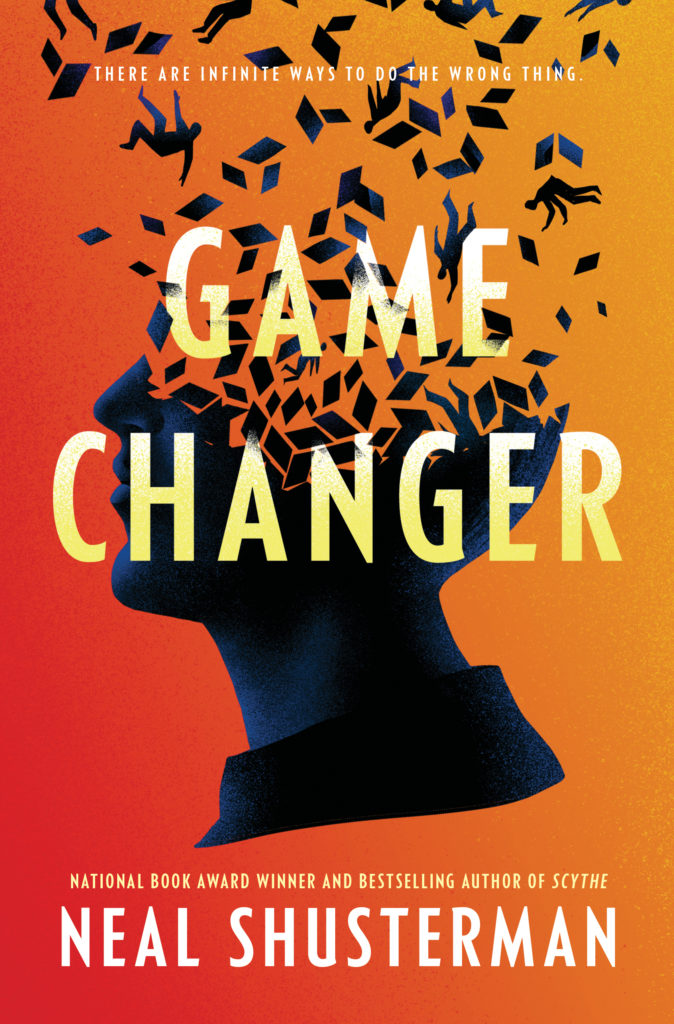Rob Bittner
I got into a fight with Leo only once about race—over two years back, when I made an asinine comment about affirmative action in social studies. I pointed out that Leo had better grades than just about anyone in class—and definitely better than anyone in the football team, which, to the simple sophomore I was at the time, was proof that no one needs to get preferential treatment because of race. Then he smacked me down with talk about all the kids who weren’t as lucky as he’d been—who didn’t have the opportunities he’d had, and found all the doors shut before they got there. “When you gotta spend all your time just kicking down the door, you’re already exhausted, and miles behind the ones who get to prance right through,” he had said. “Do you really think that’s fair?”
Shusterman 13
NOTE: In order to examine certain aspects of the novel, this review does contain some spoilers.
Neal Shusterman is no stranger to tackling harrowing and gut-wrenching themes in his work—one need only look to Scythe (2016) to witness his unapologetic exploration of mortality, morality, and the ways in which trauma affect us all in vastly different ways. Game Changer (2021) is no different. Shusterman tackles numerous intersecting themes including race, class, gender, and sexuality, through the point of view of a young man named Ash.
Ash is an average white heterosexual football player who believes he’s a pretty decent guy, overall. But when he gets tackled during a game, the force of the hit throws him into another dimension. Things seem pretty much the same at first, but differences begin to surface that throw him off (stop signs are suddenly blue, for instance, and then the football team’s name changes). Ash gets hit again, leaving him in a reality where his family is suddenly wealthy, and he has more privilege than ever. Each hit leads to an unsettling new reality where racism, homophobia, sexism, and toxic masculinity become increasingly rampant. Ash is forced to confront his biases, his privilege, and his complicity in the systems of oppression that benefit (or oppress) him with each new reality he inhabits. The question eventually becomes whether or not he will ever manage to control the shifts, or if his original reality will cease to exist entirely.
When Ash discovers that he is not being thrown into new realities, but rather that reality is changing because of him—he has become the literal center of the universe—he starts to understand the significance of his power. This becomes particularly clear when in one reality the outcome of Brown v. Board of Education sees segregation upheld, and his friend Leo is no longer able to attend their school. In this instance, being wealthy, heterosexual, white, cisgender, and male means that Ash is as privileged as he can be. But seeing Leo become even more oppressed in that reality makes Ash think harder about how to use his privilege for good.
Ash’s privilege does not remain constant, however, and in other realities he occupies less privileged spaces. At one point he is a drug dealer, while at another point he is gay, and in another reality he is a different gender. These realities offer readers a glimpse into important examinations of race, class, and gender hierarchies and will be sure to highlight many areas for further discussion. That being said, these realities are brief and less focused in comparison to the ones in which Ash gains particular advantages based on his shifting identity.
Shusterman’s decision to focus on a white, heterosexual, cisgender protagonist, is both understandable and yet somewhat troubling. The point of the text is to confront privilege and learn about oppression, and Ash’s identity markers ensure that readers are aware of his many points of privilege from the outset. This also enables Shusterman to more explicitly and systematically remove various aspects of privilege from his reality through each shift. At the same time, Ash being white, cisgender, and heterosexual, means that other areas of marginalization and oppression are examined through othering of secondary characters, rendering these characters and their experiences one-dimensional. Leo, therefore, ends up existing only for the purpose of teaching Ash lessons (as in the excerpt above). This is the case with a number of other characters throughout the novel, such as Norris, and to some extent Katie, who end up with their experiences and lives being oversimplified.
This is an ambitious and challenging novel that takes many chances, and while not all of them pay off, Shusterman still manages to create an intriguing and creative thought experiment to engage readers with systems of oppression and examinations of privilege. Even considering its less successful elements, Game Changer provides teen readers with an entertaining and complex narrative that is sure to open up many avenues for discussion and deeper consideration.
It can be said that teenagers often feel as though the world revolves around them, and this unique and well-paced story takes a look at what it could be like if this were actually the case.
Recommended
Shusterman, Neal. Scythe. New York: Simon & Schuster, 2016.

Game Changer (Neal Shusterman)
Quill Tree
ISBN: 978-0062465771
400 Pages, Ages 13-18
Publication date: 9 February 2021
